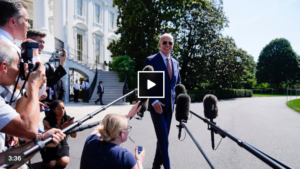The new regulations were rolled out Monday but will be on varying timelines.

In an effort to beef up protections for consumers against corporations, the Biden administration on Monday announced a handful of policies to crack down on “headaches and hassles that waste Americans’ time and money.”
Through the Federal Trade Commission (FTC) and the Federal Communications Commission (FCC), the administration will ask companies to make it as easy to cancel subscriptions and memberships as it is to sign up for them, and through the Consumer Financial Protection Bureau, a new rule will require companies to let customers cut through automated customer service “doom loops” by pressing a single button to reach a real person.
“For a lot of services, it takes one or two clicks on your phone to sign up. It should take one or two clicks on your phone to end the service,” White House Domestic Policy Advisor Neera Tanden said on a call with reporters to discuss the new policies.
Consumers could see the new rule applied to gym memberships or subscriptions with phone and internet companies.
The administration will also call on health insurance companies to allow claims to be submitted online, rather than requiring insured customers to print out and mail forms in for coverage.
“Essentially in all of these practices, the companies are delaying services to you or, really, trying to make it so difficult for you to cancel the service that they get to hold on to your money longer and longer,” Tanden said. “And what that means is, ultimately, consumers, the American public, is losing out.”

The new regulations were rolled out Monday but will be on varying timelines, with some taking weeks and others taking months to be implemented, administration officials said.
They target a range of industries and companies at a time when Americans feel strapped by high prices and stubborn inflation — an issue that has weighed on President Joe Biden and now Vice President Kamala Harris’ presidential campaign as voters continue to rank the economy among their top issues.
As part of an agenda centered around “lowering costs,” the administration has tried to improve voter confidence in the economy through consistent but piecemeal efforts to bring down daily costs, from lowering prescription drug prices to canceling student loan debt.
Volatility in the stock market last week after a lower-than-expected jobs report has increased the pressure for Democrats to prove their economic bonafides to voters. Experts urge caution before drawing any major conclusions from the week, remaining divided over whether the U.S. is headed for a downturn or still on a resilient path of growth.

Other efforts by the Biden administration to reduce daily bills and offset higher prices include targeting junk fees tacked onto tickets and hotel costs, requiring airlines to automatically refund passengers for delayed flights, and banning medical debts from credit reports.
The efforts have frequently pitted Biden and Harris against big companies, as they accuse them of “shrinkflation,” or delivering less product for the same price, and keeping their prices high even as inflation falls. The Biden administration has also been heralded by antitrust advocates for reviving enforcement on companies for the first time in a meaningful way in decades — including with lawsuits against companies like Google, Apple and LiveNation.

Tanden insisted that Monday’s efforts were about creating a better functioning market, not targeting any particular company or “shaming corporations writ large.”
“This is a broad initiative in which we are talking about a whole series of practices across multiple industries, and the real focus is ensuring that consumers and their choices are what is driving decision making in the market, not the practices of companies that make it hard for people to switch,” Tanden said.
“When they want to end one subscription, they can shop for another, but it’s their decision,” she said. “That’s what a free market is really about, empowering individuals to make the decisions they want to make without these practices that get in their way.”